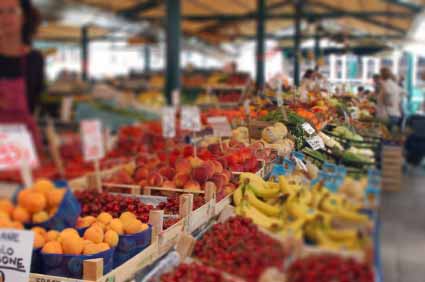Allison Smathers, MSc student studying food safety at farmers’ markets writes:
 As a kid growing up in North Carolina and traveling to the local farmers market, my greatest challenge was not the local drug dealer but the sample dealer. Saying no to samples given out by vendors at the farmers market in order to save room in my stomach for lunch was a struggle. I usually conformed and embraced knowing that if I did not finish my lunch I would suffer consequences and repercussions for my mother. Each vendor claimed to have the best, freshest, and sweetest product causing an irresistible temptation. As a freakishly nutritious-food focused kid, I only craved more from the farmers market.
As a kid growing up in North Carolina and traveling to the local farmers market, my greatest challenge was not the local drug dealer but the sample dealer. Saying no to samples given out by vendors at the farmers market in order to save room in my stomach for lunch was a struggle. I usually conformed and embraced knowing that if I did not finish my lunch I would suffer consequences and repercussions for my mother. Each vendor claimed to have the best, freshest, and sweetest product causing an irresistible temptation. As a freakishly nutritious-food focused kid, I only craved more from the farmers market.
My enjoyment of and support for the North Carolina’s farmers markets has been further encouraged through my graduate research concerning food safety at North Carolina farmers markets. During the 2010 farmers market season, I lead a group of secret shoppers who traveled to several markets in North Carolina with the purpose of collecting observations to better understand what happens, food safety risk-wise.
Food safety at farmers markets is a big deal.

In the summer of 2010, an estimated 53 cases of Salmonella Newport (nine culture-confirmed) were linked to products sold at two Iowa farmers markets. Through epidemiological interview questionnaires and testing of cases and containers, it was determined that guacamole-based products produced by La Reyna Supermarket & Taqueria were implicated as the source. The restaurant sold guacamole, red and green salsa, along with pork, chicken, and vegetable tamales at the farmers markets.
According to Iowa health officials I communicated with, Linn County Public Health had inspected the restaurant stand at the farmer’s market on the implicated date. They found that some of the ice used for cooling had melted, increasing the potential risk for temperature abuse of the products. Officials provided factors of contamination such as lack of sanitation techniques, cross-contamination, and improper washing of avocados. Improper holding temperatures were listed as a potential factor for bacterial increase due to the temperature for the day being above 80oF.
The outbreak occurred on the heels of a 2008 Salmonella enterica serotype Saintpaul outbreak with jalapeno peppers and serrano peppers that affected all of North America. First reported by New Mexico Department of Health with 19 cases, the outbreak in 2008 was linked to 1500 cases in 43 states, District of Columbia, and Canada through PulseNET. The 2008 outbreak, similar to the Iowa farmers market outbreak, was associated to foods such as salsa and guacamole made with hot peppers but grown in Mexico – temperature abuse of those dishes was also a factor.
In my study, data collectors observed practices including temperature abuse, hygiene issues and the potential for cross contamination. In one instance a data collector was sold a tamale that had been stored in a canvas-cooler without ice and outdoor temperatures over 80oF. We saw salsa and guacamole held without coolers as well.
Storage and preparation of food products is important for ensuring patrons sample and purchase not only a lip-smacking product, but a safe product as well. Our data collectors also noted a lack of handwashing facilities at many of the markets; making it difficult for vendors to follow disease prevention best practices.
Through my project, the occurrence of potential risks at farmers’ markets in North Carolina is being addressed. I’m using the observation data generated last year to create training materials and tools to support good food safety culture actions at North Carolina farmers markets. Hopefully my work will lay the foundation for managers and vendors to address farm-to-fork risks. An outbreak can affect the entire farmers’ market brand.
Beyond just what the data collectors saw, information on the factors that led to the Iowa outbreak is being used to develop good farmers’ market practices. It’s necessary to learn from past outbreaks and address factors that increase risk. Implementing preventative guidelines, for all food producers, handlers, and vendors are necessary not only to protect patrons but also to protect vendors from potential scrutiny, inability to sell products, and loss of profit.
In an effort to ensure children have the opportunity to fall into a lifestyle of temptation by vendors giving out samples, food safety at our local markets is important. Being purposeful about the food safety of samples at farmers markets ensures the only risk a child takes on is overconsumption and repercussions from mom and not consequences of risky practices that can lead to illness.
Allison Smathers is a graduate student in the department of Food, Bioprocessing and Nutrition Sciences at North Carolina State University. She is a rabid runner, surfer, Denver Nuggets fan and enjoys shopping at farmers’ markets.
